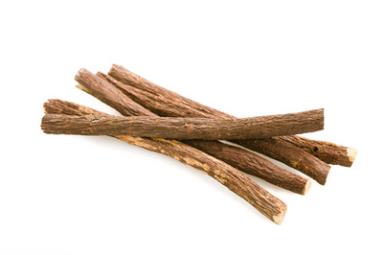
Know Our Herbs

Glycyrrhiza Glabra Bois
English Name:- Liquoric Root.
Botanical Name:- Glycyrrhiza glabra.
Family:- FABACEAE.
Parts- Used:- Root, Underground stem, Leaves.
Habit:- A perennial small shrub with pinnate compound leaves, purple flowers.
Taste:- Sweet
Chemical Constituents:- Plant contains Glycyrrhizin, Glycyrrhizin acid, It is 5 times more sweeter than the normal sugar, Glycosides, Steroids, Glucose, Sucrose, Resin, Starch and Essential oil.
Actions:- Tonic, Appitizer, Anti-emetic, Cooling, Rejuvenator, Expectorant, Diuretic, Anti-inflammatory and Wound healing, Aphrodisiac, Blood purifying.
Used In:- Cough, Vomiting, Wound healing, Haematemesis, Thirst, Cholera, Skin disease, Spermopoitic, Heart disease, Epilepsy.
Usages
- A particular form of its species called DGL is preferred for healing ulcers.
- It helps fight eczema psoriasis and dermatitis.
- It also hastens the healing process of cold sores and reduces the pain associated with them.
- It treats severe respiratory problems like asthma, sore throat, coughing and bronchitis.
- This herb helps maintain a balance in the estrogen levels in the body.
- It provides proper support to the adrenal glands and removes stress and fatigue.
- It helps block the break down of cortisol in the body.
- This herb is also used to treat both chronic and acute hepatitis B & C.
- It slows down the progression of HIV and AIDS because it is virus fighting agent.
- It removes irritable conditions of mucous membrane of the urinary order.
- It is beneficial in treating anorexia and persistent low fevers.
Cautions
- Its high intake may lead to sudden rise in blood pressure or cause hormonal imbalance that may affect the fetus.
- It causes potassium depletion and may prove hazardous for the people with heart problems.
- The elderly persons suffering from kidney problems should avoid its use.
- Women on oral contraceptives are also sensitive to its consumption.
- This herb is strictly prohibited for those with cirrhosis and gall bladder disease.
- Its high intake may cause menstrual problems.
Disclaimer
Information on the traditional uses and properties of herbs provided on the site is for educational use only, and is not intended as medical advice. Every attempt has been made for accuracy but none is guaranteed. Many traditional uses and properties of this herb have not been validated by the FDA. If you have any serious health concern you should consult with your health care practitioner before self administering this herb.
